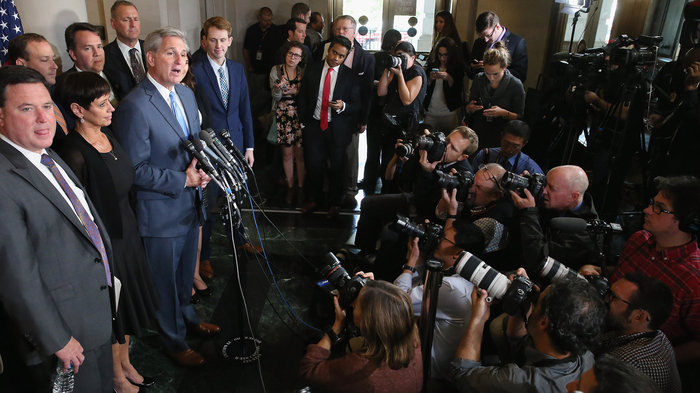
In a shocking move Thursday afternoon, House Majority Leader Kevin McCarthy, R-Calif., pulled out of the race for speaker of the House, throwing the GOP leadership race into chaos and confusion.
According to Republican congressmen coming out of the caucus meeting — where lawmakers were expected to pick a successor to retiring House Speaker John Boehner — McCarthy told Republicans he didn’t have a path to victory.
Rep. Tom Rooney, R-Fla., said the meeting opened, Republicans said the Pledge and then McCarthy stood up and took himself out of the race. The prohibitive favorite said he didn’t want members to take arrows for voting for him and that he was taking himself out of contention.
Speaker Boehner then immediately moved to adjourn the meeting. Rooney said there was «total shock» and some members were audibly crying.
McCarthy said later after exiting the meeting that he was putting the GOP conference first in his decision, and that there was clamoring for new leadership.
«For us to unite, we probably need a fresh face. If we are going to unite and be strong, we need a new face to help do that,» McCarthy said. «I feel good about the decision. I think we’re only going to be stronger.»
McCarthy, the No. 2 to Boehner, was the heavy favorite going into Thursday’s vote. But with a significant bloc of conservatives, known as the House Freedom Caucus, throwing their support behind Florida Rep. Dan Webster, and with the last-minute candidacy of Utah Rep. Jason Chaffetz, McCarthy withdrew rather than face a possibly fractious vote.
McCarthy had been under fire recently after he gave an interview seeming to suggest that the controversial special congressional committee investigating the Benghazi terrorist attacks were meant to damage Democrat Hillary Clinton’s presidential bid. McCarthy later apologized and clarified, but some feared the damage had been done. In his brief remarks after the meeting, McCarthy admitted that those ill-phrased remarks didn’t help him.
Ultimately, McCarthy also sounded wary of inheriting the same rebel caucus that doomed Boehner multiple times and forced him into stalemates.
«We all worked to get the majority. And I had a lot of friends that were really supportive that said, ‘Why do you want to do it during this time? This time will be the worst time. They’re going to eat you and chew you up,'» he told Politico in an interview after his announcement.
The House GOP tweeted that leadership elections now would be held at a later date. Boehner announced last month he would resign at the end of October, but after Thursday’s dramatic turn of events Boehner said he would remain Speaker until a new successor was chosen.
Boehner’s exit announcement last month left open the top spot in the House, along with the majority leader and whip positions. The official election for House speaker — which is voted on by the full House — had been originally scheduled for the end of the month.
In order to break the stalemate, there may need to be a consensus candidate who could appeal to both conservatives and mainstream Republicans — a difficult task given the fractious caucus. But one person who could bridge that gap, some members said, is Wisconsin Rep. Paul Ryan, who was the party’s 2012 vice presidential nominee.
Rep. Charlie Dent, R-Pa., said Ryan was probably the only lawmaker who could get the necessary 218 votes in the caucus. Ryan, however, has already issued a statement that he won’t run.
But the Washington Post reported later Thursday that Boehner had personally pleaded with Ryan to run for speaker in two separate phone conversations.
Dent, one of the few remaining moderate Republicans in the House and a close ally of Boehner, said lawmakers might need to form a coalition with Democrats to find a consensus speaker. Republicans are divided and «anyone with eyes can see it,» Dent said.
Rep. Dana Rohrabacher, R-Calif., said Republicans may need a «caretaker speaker» or someone who will be speaker until new elections can be held in January 2017. They’d have to be a senior member who would not run for a full term though.



Expositores: Oscar Vidarte (PUCP) Fernando González Vigil (Universidad del Pacífico) Inscripciones aquí. Leer más
Una retrospectiva para entender los próximos cuatro años. Leer más
En la conferencia se hará una presentación de los temas más relevantes del proceso de negociación se llevó a cabo desde el 2012, así como del acuerdo de paz firmado entre el Gobierno colombiano y la guerrilla de las FARC a finales del 2016. Se analizarán los desafíos y las... Leer más
El Observatorio de las Relaciones Peruano-Norteamericanas (ORPN) de la Universidad del Pacífico es un programa encargado de analizar y difundir información relevante sobre la situación política, económica y social de Estados Unidos y analizar, desde una perspectiva multidisciplinaria, su efecto en las relaciones bilaterales con el Perú.
© 2026 Universidad del Pacífico - Departamento Académico de Humanidades. Todos los derechos reservados.

